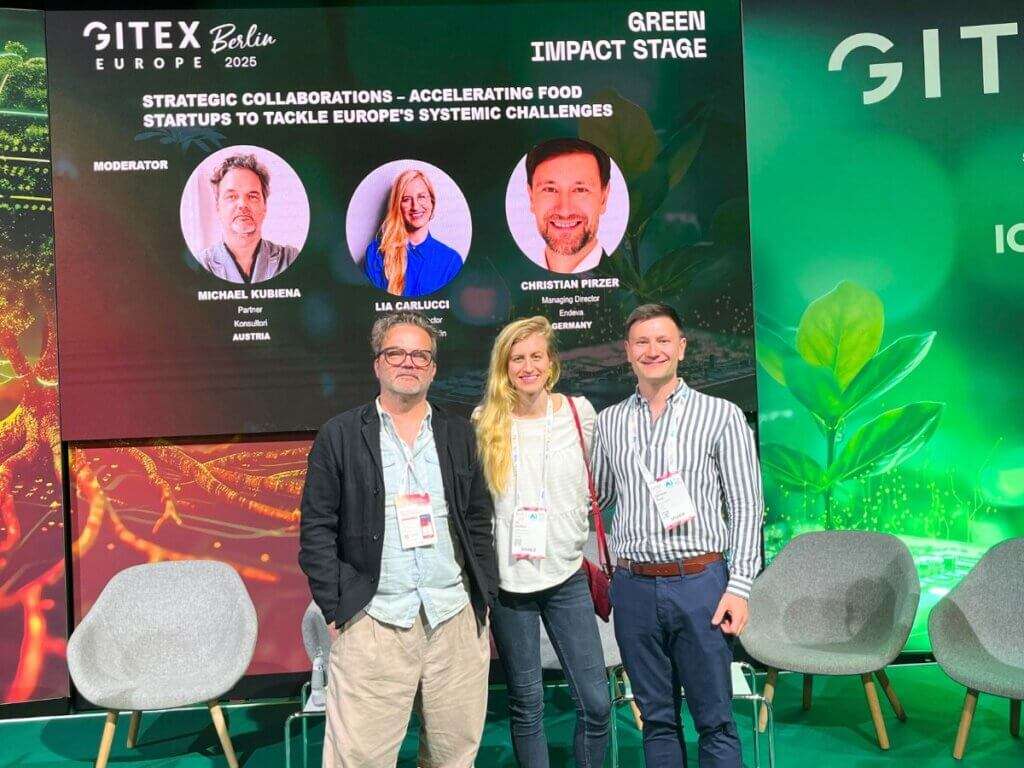Konsultori’s Panel on the GITEX Green Impact Stage — Moderated by Michael Kubiena
At GITEX EUROPE 2025, Konsultori’s partner Michael Kubiena moderated a compelling panel on how strategic collaborations are integral to tackling Europe’s systemic food challenges. The central question that guided the discussion was:
How can strategic collaborations – especially those between food startups and other food system actors – contribute to addressing and resolving the complex challenges in our contemporary food systems? And what does it take to make such collaborations work and create a lasting impact?
The conversation underscored the power of intra- & intersectoral partnerships as a catalyst for driving large-scale, transformative food system innovation. Collaborations are not a silver bullet (i.e. a solution for everything) though; plus, they need to be carefully planned, curated and consistengly managed and executed.
Food Collaboration Alliance
Connect with food ecosystem players for collaborative problem-solving and innovation!
Meet the Panellists: Insights on Food System Innovation
Lia Carlucci, Managing Director of Food Campus Berlin, is at the forefront of facilitating innovation in the food system.
Food Campus Berlin, a physical and digital place as a transformation accelerator, will become an entire ecosystem of start-ups, companies and science. It will also be a springboard for solution concepts and at the same time a stage for innovation projects in the food industry.
Christian Pirzer, Managing Director at Endeva, connected the dots between advanced technologies and food system innovation. Endeva’s work facilitates system-level innovation through collaboration and agile design approaches.
Endeva’s strategic focus on designing and facilitating system innovations and cross-sector collaboration resonates strongly with today’s tech pioneers.
By applying methods like:
🔹 Design thinking
🔹 User-centricity
🔹 Rapid prototyping
🔹 Continuous learning
….we help drive meaningful innovation and transformation — especially in collaborative and systems-level environments that are so critical to the success of tech start-ups.
Michael Kubiena, Konsultori’s strategy and organization design expert and panel moderator, stressed the critical role of collaboration frameworks:
Strategic collaborations food startups engage in must build trust, align visions, and foster adaptability to create lasting impact in solving Europe’s food system challenges.
Pineapple and cabbage juice: novel combinations can make for successful collaborations!
The panellists shared several real-world examples to illustrate the diversity and, at times, surprising nature of successful food system collaborations.
NotCo & Kraft Heinz
The Chilean startup NotCo (powered by their AI technology named Giuseppe, highly successful in the Americas with its plant-based milks made from unlikely ingredient combinations such as pineapple and cabbage juice is partnering with giant Kraft Heinz. Their joint venture seeks to transform the way consumers enjoy plant-based foods.
The Millers for Nutrition Coalition
Endeva is helping to facilitate a collaboration, Millers for nutrition coalition, which is original in another way, since it brings together private sector partners which elsewhere may compete with each other. With the goal of reaching 1 billion people by 2026 through the provision of adequately fortified flour, oil, and rice, the Millers for Nutrition Coalition is being implemented in eight countries in Africa and Asia.
Food Collaboration Alliance
Connect with food ecosystem players for collaborative problem-solving and innovation!
Key Themes from the Panel: Collaboration as a Driver of Systemic Change
The panel discussion focused on the critical role of collaboration among diverse actors in transforming contemporary food systems to address complex challenges and seize emerging opportunities. Key themes included:
1. Opportunities and Challenges in Food Systems
The discussion began by highlighting the significant challenges facing current food systems, such as sustainability, nutrition, and resilience, while also exploring the opportunities for positive change through innovation and cooperation.
2. The Importance of Multi-Actor Collaboration
- Panellists examined how collaboration between startups, SMEs, corporates, researchers, civil society, public sector, and local governments is essential for driving sustainable solutions that no single actor can achieve alone.
- Examples of impactful and meaningful collaborations were shared, emphasising the value of partnerships in achieving systemic change.
3. Characteristics and Impact of Successful Collaborations
- The panel identified characteristics and commonalities of collaborations that make a lasting impact, including shared objectives, mutual benefits, and clear roles.
- Best practices and successful examples were discussed, both within Europe and in cooperation with non-European partners.
4. Facilitating and Sustaining Collaboration
- Discussion covered what is required to facilitate effective collaborations, such as building trust, aligning goals, and overcoming obstacles like misaligned incentives or lack of resources
- The importance of fostering the right attributes and attitudes among collaborators was emphasised to ensure long-term success.
Conclusion
The session concluded that multi-stakeholder collaboration is indispensable for sustainable food system transformation, requiring deliberate facilitation, shared vision, and continuous learning
Final Thoughts: Advancing Food System Innovation through Strategic Collaboration
The panel at GITEX EUROPE was a powerful reminder that tackling Europe’s systemic food challenges demands strategic collaboration across sectors, disciplines, and borders. By fostering ecosystems where food startups can thrive alongside tech pioneers, investors, and policymakers, we can accelerate the transition toward a sustainable, equitable, and resilient food future.
At Konsultori, we’re proud to support these dynamic collaborations. Through the Food Collaboration Alliance and beyond, strategic collaborations that food startups engage in are the foundation for building Europe’s food systems of tomorrow.
About GITEX EUROPE 2025
GITEX EUROPE, Europe’s leading tech and startup event, took place from May 20-22, 2025, at Messe Berlin. With over 40,000 professionals, 2,000 exhibitors, and 1,000 startups from more than 100 countries, the event showcased cutting-edge technologies shaping the continent’s digital future. Key themes like AI, quantum computing, green hydrogen, and sustainability were at the forefront. The Green Impact Stage provided a platform to discuss how innovation can solve Europe’s pressing systemic challenges, especially in food systems.
Food Collaboration Alliance
Connect with food ecosystem players for collaborative problem-solving and innovation!
